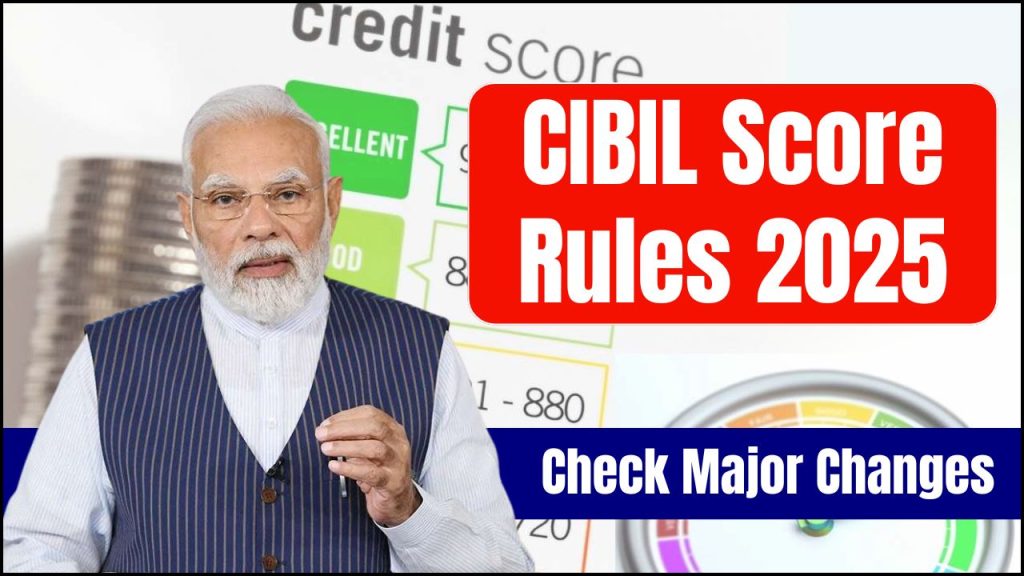
The CIBIL score, also known as the credit score, is one of the most critical factors in determining an individual’s financial trustworthiness in India. It plays a major role in the approval of loans, issuance of credit cards, and the determination of interest rates. This score typically ranges between 300 and 900, with a higher score indicating better creditworthiness.
In 2025, the Reserve Bank of India (RBI) introduced a set of transformative rules for calculating and managing CIBIL scores. These rules aim to promote financial transparency, consumer empowerment, and fairer access to credit. Let’s explore these changes in detail.
Understanding the CIBIL Score System
Before diving into the updates, it is essential to understand the purpose and significance of the CIBIL score.
| CIBIL Score Range | Creditworthiness | Loan Approval Likelihood |
|---|---|---|
| 750 – 900 | Excellent | Very High |
| 700 – 749 | Good | High |
| 650 – 699 | Average | Moderate |
| 600 – 649 | Low | Low |
| 300 – 599 | Poor | Very Low |
The score is calculated based on several factors, including:
- Timely payment of EMIs
- Credit utilization ratio
- Length of credit history
- Types of credit used
- Frequency of loan applications
Key Changes to CIBIL Score Rules in 2025
In a landmark move, the RBI has revamped the CIBIL scoring system to make it more transparent and user-friendly. These changes are expected to enhance the efficiency of the credit system while protecting the interests of borrowers.
1. Bi-Monthly Score Updates
Previously, individuals had to wait for months before updates to their credit scores were reflected. This caused delays in loan approvals even if someone had cleared their dues promptly.
With the new rule, credit scores will be updated every 15 days. This means that if you pay off a loan or a credit card bill, the improvement in your credit score will reflect within two weeks, offering faster access to credit facilities.
| Update Frequency | Before 2025 | After 2025 |
|---|---|---|
| CIBIL Score Update | Every 1–2 months | Every 15 days |
2. Mandatory Reporting by Financial Institutions
Banks, Non-Banking Financial Companies (NBFCs), and other credit institutions are now required to report credit data every two weeks. This will ensure that the borrower’s credit behavior is captured and reflected promptly in the score, reducing the risk of outdated information.
Free Credit Reports and Error Correction Process
Transparency has been a major concern in the credit reporting ecosystem. To tackle this, the RBI has introduced stronger consumer rights concerning credit report access and grievance redressal.
1. Free Credit Report Annually
Every individual is now entitled to one free credit report every year, which can be accessed directly from CIBIL or other credit bureaus. This report will allow users to examine:
- Loan and credit card histories
- Missed or late payments
- Errors or fraudulent activity
2. Quick Resolution of Discrepancies
If an individual finds any error in their credit report, they can raise a dispute. The concerned financial institution must correct the issue within 30 days.
3. Penalty for Delay
If the correction is not completed within 30 days, the responsible bank or NBFC must pay a penalty of ₹100 per day until the correction is made.
| Consumer Right | Details |
|---|---|
| Free Credit Report | Once per year |
| Correction Deadline | 30 days from the date of dispute |
| Penalty for Delay | ₹100 per day post-deadline |
Transparent Loan Rejection Protocol
In the past, many loan applicants faced rejection without any explanation. This left borrowers confused and unaware of how to improve their credit profile.
Under the 2025 rules:
- All banks and NBFCs must now clearly inform applicants of the reason for loan rejection.
- The communication should mention the specific element(s) in the credit report that led to the rejection.
- Borrowers will also be given suggestions on how to improve their credit score to become eligible for loans in the future.
| Old Scenario | New Rule (2025 Onwards) |
|---|---|
| No explanation for loan rejections | Detailed reason with actionable improvement suggestions |
This rule is expected to empower consumers, reduce confusion, and promote responsible credit behavior.
Proactive Alerts for Repayment Defaults
Another key change is the obligation placed on financial institutions to alert borrowers when they are at risk of missing repayments.
If a borrower is close to defaulting on an EMI or credit card bill, the bank must:
- Send a pre-emptive notification via SMS, email, or app alerts.
- Allow the borrower an opportunity to make payments and avoid score damage.
This change emphasizes the RBI’s commitment to consumer protection and financial literacy.
| Before 2025 | After 2025 |
|---|---|
| No alert for upcoming defaults | Mandatory alerts for potential repayment defaults |
| Credit score could drop without notice | Consumers get time to act and preserve their score |
Benefits of the 2025 CIBIL Score Rules
These reforms will have a far-reaching impact on millions of borrowers in India. Here are the top benefits:
| Benefit | Explanation |
|---|---|
| Faster Score Updates | Helps in timely loan approvals after dues are cleared |
| Free Annual Credit Report | Enables financial self-assessment |
| Transparent Grievance Redressal | Protects against misinformation or fraud in credit history |
| Clear Loan Rejection Reasons | Provides borrowers with clarity and improvement direction |
| Pre-default Alerts | Helps prevent score damage by encouraging on-time payments |
| Penalty for Non-compliance by Banks | Forces institutions to be accountable |
Steps to Check Your Free Credit Report
Here is how individuals can access their free annual credit report:
- Visit the official credit bureau website, like www.cibil.com.
- Create an account or log in.
- Authenticate your identity using OTP or KYC documents.
- Access your free credit report once per year.
You may also visit other RBI-approved bureaus such as Experian, Equifax, or CRIF High Mark for the same.
What Borrowers Should Do Now?
If you are planning to take a personal loan, home loan, education loan, or apply for a credit card, here are some actions you should take under the new rules:
- Check your CIBIL score regularly
- Make timely EMI payments
- Monitor your credit utilization ratio
- Avoid multiple loan applications within a short span
- Report any discrepancies in your credit report promptly
Staying vigilant and informed will help you maintain a healthy credit score and improve your chances of accessing credit when needed.
Key Takeaways
The CIBIL Score Rules 2025 mark a significant step forward in making India’s credit system more transparent, fair, and consumer-friendly. With faster score updates, clear communication from banks, and a penalty-driven grievance system, the rules are designed to empower borrowers, improve access to loans, and build financial literacy across the country.
For every Indian citizen aspiring to buy a home, fund a business, or simply get a credit card, understanding and following these new credit norms will prove invaluable. Make sure you take full advantage of your rights and stay on top of your credit profile in this new era of financial governance.

Katherine Johnson is a passionate writer with a keen interest in storytelling, content creation, and creative expression. She enjoys exploring diverse topics and crafting engaging narratives that captivate readers.



